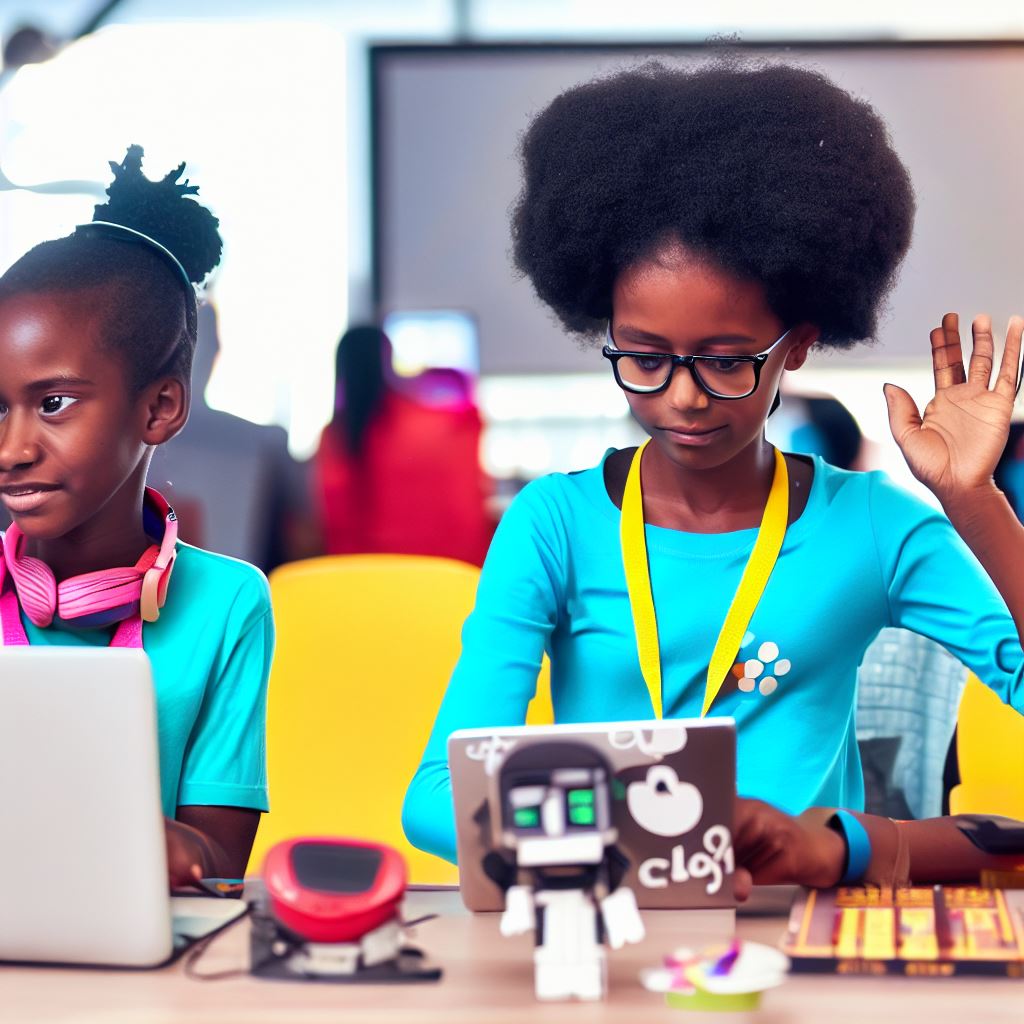Introduction
The Hour of Code initiative is an annual global event that aims to introduce kids to coding and computer science.
It encourages young students to participate in fun and interactive coding activities.
Importance of hosting coding events for kids
Hosting coding events for kids is crucial in today’s digital age.
Teaching children coding skills at an early age helps develop problem-solving abilities, logical thinking, and creativity.
It also paves the way for future career opportunities in the technology industry.
By organizing coding events for kids, we can inspire and ignite their interest in computer science.
These events provide a platform for children to explore coding in a supportive and engaging environment.
They get the opportunity to work in teams, collaborate, and learn from each other’s experiences.
Moreover, coding events for kids empower them to become creators rather than just consumers of technology.
They learn how to build websites, create games, and design apps, fostering their creativity and innovation.
These events also help promote diversity and inclusivity in the tech field by encouraging children from all backgrounds to participate.
Additionally, hosting coding events exposes kids to real-world applications of coding.
They can see how coding is used in various industries and understand its relevance in solving complex problems.
This hands-on experience enhances their understanding of technology and its potential to shape the world around them.
Basically, hosting coding events for kids through the Hour of Code initiative is vital for nurturing their interest in coding, enhancing their problem-solving skills, and preparing them for the future.
Tech Consulting Tailored to Your Coding Journey
Get expert guidance in coding with a personalized consultation. Receive unique, actionable insights delivered in 1-3 business days.
Get StartedThese events create opportunities for kids to explore, learn, and grow in a field that is becoming increasingly important in our digital society.
Understanding the Hour of Code
The Hour of Code program is an initiative designed to introduce children to coding and computer science.
It aims to demystify coding and make it accessible to all children, regardless of their background or experience.
Its goals and objectives
The goals of the Hour of Code are to promote computational thinking, problem-solving skills, and creativity among children.
It aims to inspire them to pursue coding and related fields in the future.
The Hour of Code also seeks to address the gender and diversity gap in computer science by encouraging all children to participate.
How it promotes coding education for children
The Hour of Code promotes coding education for children through a variety of means.
It provides an extensive collection of online tutorials and resources that are designed to be interactive and engaging.
These tutorials cover a wide range of coding concepts and languages, from simple block-based coding to more advanced programming languages like Python and JavaScript.
The tutorials offered by the Hour of Code are designed to be self-paced and accessible to children as young as kindergarten age.
They are structured in a way that allows children to progress at their own pace and choose topics that interest them.
The tutorials include step-by-step instructions, interactive coding exercises, and puzzles that help children learn coding concepts in a fun and engaging manner.
In addition to the online tutorials, the Hour of Code also encourages schools, libraries, and community centers to host coding events for children.
These events provide an opportunity for children to collaborate, learn from each other, and showcase their coding projects.
Build Your Vision, Perfectly Tailored
Get a custom-built website or application that matches your vision and needs. Stand out from the crowd with a solution designed just for you—professional, scalable, and seamless.
Get StartedHosting a coding event for kids requires some planning and preparation, but it can be a rewarding experience for both children and organizers.
Tips for hosting a successful coding event for kids
- Set clear goals and objectives for the event. Determine what you want the children to learn and achieve during the event.
- Choose a suitable venue that can accommodate the number of participants and provide a conducive environment for coding activities.
- Determine the age range and skill level of the children attending the event. This will help you tailor the activities and tutorials to their needs.
- Provide a variety of coding activities and materials to cater to different interests and learning styles. Consider offering both online tutorials and hands-on coding projects.
- Recruit knowledgeable and enthusiastic volunteers who can assist the children during the coding activities. They can provide guidance and support, especially for children who are new to coding.
- Arrange for age-appropriate coding tools and resources, such as laptops, tablets, and coding kits. Make sure these resources are easily accessible to the children during the event.
- Create a schedule or timetable that outlines the sequence of activities and allows for breaks and rest periods. This will help keep the event organized and ensure that all activities are covered.
- Encourage collaboration and teamwork among the children. Provide opportunities for them to work in pairs or groups and solve coding challenges together.
- Celebrate the children’s achievements by showcasing their coding projects or organizing a mini coding competition. This will motivate and inspire them to continue learning and exploring coding beyond the event.
- Collect feedback from the children and their parents or guardians after the event. This will help you evaluate the success of the event and make improvements for future coding events.
By hosting a coding event for kids as part of the Hour of Code program, you are providing an opportunity for children to discover the joys of coding and unleash their creativity.
It is a wonderful way to contribute to their educational development and equip them with valuable skills for the future.
Choosing a Venue and Date
When it comes to hosting a coding event for kids, selecting the right venue and date is crucial. Here are some tips to make the process smoother:
Importance of selecting an appropriate venue
- Consider the accessibility of the venue. Make sure it is easy to reach for both participants and their parents.
- Look for a venue with enough space to accommodate all the attendees comfortably. Kids need room to work and move around.
- Check if the venue has the necessary equipment required for coding activities, such as computers, power outlets, and internet access.
- Consider the overall ambiance of the venue. It should be inviting and conducive to a learning environment.
- Choose a venue that meets safety requirements. Ensure there are emergency exits, first aid kits, and precautions in place.
Tips for choosing a date that suits the target audience
- Research school calendars to choose a date when kids are likely to be available. Avoid scheduling during major exams or holidays.
- Consider the age group you are targeting and their typical schedules. Find a time when they are likely to be free.
- Consult with parents or guardians to understand their preferences and constraints regarding scheduling.
- Avoid weekends when families usually have other commitments. Weekdays after school or during holidays might be better.
Consider factors such as accessibility, space, and equipment requirements
- Choose a venue that is easily accessible via public transportation or has ample parking space for those driving.
- Make sure the venue has enough space to accommodate all the planned activities, including breakout sessions or workshops.
- Check if the venue can provide the necessary equipment needed for coding activities or if you need to arrange for them separately.
- Consider any additional requirements, such as writing boards or projectors, based on the coding activities planned.
Essentially, selecting the right venue and date for a coding event is crucial for its success.
The venue should be suitable, safe, and accessible, while the date should consider the availability and convenience of the target audience.
By carefully considering these factors, you can ensure a positive and engaging experience for the young participants.
Read: Top 5 YouTube Channels for Kids to Learn Coding
Organizing the Event
When organizing a coding event for kids, it is essential to consider several factors that will contribute to its success.
From defining the target age group to recruiting volunteers and instructors, strategic planning is needed to ensure an engaging and enjoyable experience for all participants.
Define the target age group for the coding event
First and foremost, you need to determine the age group that your coding event will cater to.
Consider the complexity of the coding activities you plan to offer and the level of comprehension children of different ages may have.
This will help you create a curriculum that is both challenging and accessible for the participants.
For younger kids, aged between 6 and 9, focus on introducing basic coding concepts through fun and interactive activities.
Optimize Your Profile, Get Noticed
Make your resume and LinkedIn stand out to employers with a profile that highlights your technical skills and project experience. Elevate your career with a polished and professional presence.
Get NoticedUtilize visual programming languages and tools that incorporate game-like elements to keep them engaged.
Older students, aged 10 and above, may benefit from more advanced coding exercises using industry-standard languages like Python or JavaScript.
Discuss the recommended size of the event
The size of the coding event is an important factor to consider, as it can influence the overall experience for both participants and organizers.
A smaller event with a limited number of participants allows for more individualized attention and a better student-to-instructor ratio.
This ensures that each child receives adequate guidance and support throughout the coding activities.
However, hosting a large-scale event can create a vibrant and energetic atmosphere, fostering collaboration and networking among participants.
It also provides the opportunity to reach a wider audience and promote the importance of coding education in the community.
To strike a balance, consider dividing the event into smaller groups or sessions based on age or skill level.
Suggestions for recruiting volunteers and instructors
Recruiting dedicated volunteers and instructors is crucial for the success of your coding event.
Start by reaching out to local schools and tech companies, showcasing the impact of coding education and the benefits of volunteering.
Offer opportunities for volunteers to share their experiences and expertise in coding with eager young minds.
Additionally, engage with online coding communities and social media platforms to expand your reach.
Utilize hashtags such as #codingforkids or #programmingeducation to connect with like-minded individuals.
Offer incentives such as certificates of recognition, networking opportunities, or even small tokens of appreciation to motivate volunteers.
Hosting a coding event for kids requires careful planning and organization.
Defining the target age group, discussing the recommended size of the event, and recruiting enthusiastic volunteers and instructors are essential steps towards creating a successful coding event that inspires and educates young minds.
Read: Accessible Coding Classes for Kids with Special Needs
Planning the Coding Activities
When it comes to organizing a coding event for kids, planning the activities is crucial.
Creating engaging and interactive coding challenges will ensure that children have a fun and educational experience.
Importance of engaging and interactive coding activities
One of the key aspects of hosting a successful coding event for kids is to emphasize the importance of engaging and interactive activities.
Children learn best when they are actively involved in the learning process.
By providing coding challenges that require hands-on participation, kids will become more interested and motivated to learn.
Interactive activities not only make the learning experience enjoyable but also enhance problem-solving and critical thinking skills.
List of suitable coding languages and resources for kids
When planning coding activities, it is essential to choose coding languages and resources that are suitable for kids.
Here are some popular coding languages and resources that are well-suited for young learners:
- Scratch: Scratch is a block-based visual programming language that is designed specifically for kids. It allows them to create interactive stories, games, and animations.
- Python: Python is a widely-used programming language that is easy for kids to learn. It has a straightforward syntax and is often used in educational settings to introduce coding concepts.
- Code.org: Code.org is an online platform that offers a variety of coding courses and resources for kids. It provides beginner-friendly lessons and coding challenges.
- LEGO Education: LEGO Education offers coding kits that combine physical building with coding. These kits allow kids to build and program their own robots using LEGO bricks.
Share ideas for incorporating fun and educational coding challenges
To make the coding event more engaging and enjoyable, it is important to incorporate fun and educational coding challenges. Here are some ideas:
- Game development: Encourage kids to create their own games using coding. They can design the gameplay, characters, and levels, enhancing their creativity and problem-solving skills.
- Robotics: Introduce kids to robotics by providing coding challenges that involve programming robots to perform specific tasks. This hands-on activity will spark their interest in both coding and engineering.
- Web design: Teach kids the basics of HTML and CSS coding by having them create their own websites. They can design the layout, add content, and learn how to customize their web pages.
- Online coding competitions: Organize coding competitions where kids can showcase their coding skills and compete against each other. This will foster a sense of healthy competition and motivation to excel.
In general, planning the coding activities for a kids’ coding event is crucial for a successful and engaging experience.
By emphasizing the importance of interactive activities, providing suitable coding languages and resources, and incorporating fun and educational challenges, kids will have a memorable and enriching coding event.
So, gear up and plan an exciting coding event to ignite the passion for coding in young minds!
Read: Introducing Kids to Robotics Through Coding Classes
Securing Equipment and Resources
In order to host a successful coding event for kids, it’s important to secure the necessary equipment and resources. Here are some tips to help you with this:
Necessary equipment
Computers, tablets, or robots are essential for coding events.
These devices can be used to teach kids the basics of coding and allow them to practice their skills.
Tips on obtaining or borrowing necessary resources
If you don’t have access to enough computers or other devices, consider reaching out to local schools, libraries, or community centers to see if you can borrow them for the event.
You could also ask parents to bring laptops or tablets from home.
Utilizing online coding platforms and tools
Online coding platforms and tools can be a great resource for hosting coding events.
They often provide tutorials, interactive coding lessons, and the ability for kids to share their projects with others.
Some popular options include Scratch, Code.org, and Tynker.
By making sure you have the necessary equipment and resources for your coding event, you’ll greatly increase the chances of its success.
Kids will have the tools they need to learn and practice their coding skills, ensuring a fun and engaging experience for everyone involved.
Read: Should Coding be a Mandatory Subject in Schools?

Promoting the Event
Promoting your Hour of Code event for kids is crucial. Here’s how to ensure your efforts hit the mark:
- Harness Social Media: Utilize platforms like Facebook, Twitter, and Instagram. Share engaging posts with event details, captivating visuals, and relevant hashtags.
- Leverage Local Outlets: Contact local newspapers, magazines, and radio stations. Share your event’s story, emphasizing its educational value and community impact.
- Engage Schools: Collaborate with local schools by distributing flyers or organizing school visits. Teachers can spread the word to students and parents.
- Word-of-Mouth: Encourage participants from previous years to share their positive experiences with friends and family. Happy attendees can be your best promoters.
- Involve the Community: Partner with local businesses and community organizations. They can help promote the event and even sponsor some of the activities.
- Create Buzz: Host a pre-event meetup or workshop to generate excitement. Share sneak peeks of what kids will learn and create.
- Email Campaigns: Send out informative emails to your mailing list. Include event details, registration links, and a call to action.
- Website Presence: Ensure your event has a dedicated, user-friendly website. It should contain all necessary information and easy registration options.
- Press Releases: Craft compelling press releases and distribute them to local media outlets. Highlight the event’s educational objectives and its importance for the community.
- Engage Influencers: Partner with local influencers who can reach a broader audience. They can vouch for the event’s credibility and create hype.
Remember, a successful Hour of Code event relies on reaching as many young learners as possible.
Combine these strategies to create a buzz that will not only fill your event but also leave a lasting impact on your community.
Preparing for the Event
Hosting a coding event for kids can be a truly rewarding experience for both the organizers and attendees.
However, in order for the event to be successful, proper preparations need to be made.
In this section, we will outline some suggested preparations that can help ensure a smooth and enjoyable coding event for kids.
Suggested preparations such as venue setup and testing equipment
The first step in hosting a coding event is finding a suitable venue.
It should have enough space to accommodate the number of attendees and have access to power outlets for their laptops or devices.
Set up the venue with tables and chairs, ensuring that there is enough space for the kids to work comfortably.
Testing the equipment before the event is crucial to avoid any technical glitches during the coding activities.
Make sure the internet connection is stable and the coding software is working properly.
This will save time and prevent any frustrations for both the attendees and organizers.
Importance of having clear schedules and instructions
Having a clear schedule and providing instructions is essential to keep the coding event organized.
Create a timetable that outlines the activities and breaks, ensuring that there is enough time for the kids to learn and practice coding.
Provide clear instructions on how to use the coding software and any other tools or resources that will be used during the event.
Role of volunteers and ensuring they are prepared
Volunteers play a vital role in making sure the coding event runs smoothly.
Assign specific roles to the volunteers, such as registration, technical support, or guiding the kids during coding activities.
It’s important to train the volunteers beforehand so they are prepared to assist the kids and handle any challenges that may arise.
In essence, hosting a coding event for kids requires proper preparation to ensure its success.
Choosing a suitable venue and testing the equipment beforehand are crucial steps.
Clear schedules and instructions help keep the event organized, while trained volunteers are essential for providing assistance.
By following these preparations, organizers can host a coding event that is enjoyable and beneficial for the kids.
Managing the Event
Organizing and hosting a coding event for kids requires effective management and supervision to ensure a successful and rewarding experience for participants.
Here are some strategies and tips to help you manage the event smoothly:
1. Plan Ahead
- Create a detailed schedule outlining the activities, time slots, and necessary resources.
- Assign specific roles and responsibilities to different team members to ensure smooth coordination.
- Prepare a checklist of all the required equipment, software, and internet connectivity for the event.
2. Supervise the Participants
- Have a team of volunteers or instructors who can assist and supervise the participants throughout the event.
- Ensure there is an appropriate adult-to-student ratio to maintain a safe and supportive environment.
- Monitor the participants’ progress, offering guidance and encouragement when needed.
3. Address Technical Issues
- Test all the hardware and software in advance to identify and resolve any technical issues.
- Have a backup plan in case of internet or power outages.
- Provide troubleshooting guides and knowledgeable staff to assist with technical problems during the event.
4. Promote Collaboration and Support
- Encourage participants to work together and solve coding challenges in pairs or teams.
- Organize group activities that foster collaboration, such as coding games or problem-solving exercises.
- Establish a positive and inclusive atmosphere where participants feel comfortable seeking help from their peers and mentors.
5. Create Networking Opportunities
- Arrange breaks and social activities where participants can interact and connect with each other.
- Invite guest speakers, such as professionals or students with coding expertise, to share their experiences and inspire the participants.
- Provide platforms or online communities where participants can stay connected and continue learning and collaborating beyond the event.
7. Recognize and Celebrate Achievements
- Acknowledge and appreciate the efforts and progress of each participant throughout the event.
- Offer certificates, badges, or small prizes to recognize their accomplishments and boost their confidence.
- Organize a closing ceremony or showcase where participants can present their projects and receive recognition for their hard work.
8. Gather Feedback
- Collect feedback from participants, volunteers, and attendees to improve future events.
- Create surveys or feedback forms to gather suggestions, ideas, and constructive criticism.
- Analyze the feedback received and use it as a basis for enhancing the coding event in the future.
By following these management strategies and tips, you can host a coding event for kids that is engaging, educational, and enjoyable for all the participants.
Remember, effective supervision, technical support, collaboration, and recognition are essential elements for a successful coding event.
Explore Further: Are Coding Apps Enough for a Career in Software?
Providing Support and Resources
The success of a coding event for kids extends far beyond the actual event itself.
It is equally important to provide ongoing support and resources to ensure that children continue to explore and develop their coding skills even after the event is over.
The Importance of Providing Ongoing Support and Resources
After the coding event, it is crucial to offer post-event materials and follow-up activities in order to reinforce the knowledge gained during the event and encourage further exploration.
By providing ongoing support and resources, organizers can ensure that children have the opportunity to continue practicing and honing their coding skills.
- Post-event materials can include coding tutorials, books, or online resources.
- Follow-up activities can involve coding challenges, projects, or competitions.
By offering these resources, organizers can help children build on the foundation gained during the coding event and foster their love for coding.
Suggestions for Offering Post-Event Materials and Follow-Up Activities
To effectively provide support following a coding event, organizers should consider the following suggestions:
- Create a dedicated web page or online platform where participants can access post-event materials.
- Organize regular coding challenges to keep children engaged and motivated.
- Host virtual coding sessions or webinars to answer questions and provide additional guidance.
- Collaborate with local libraries or community centers to offer coding clubs or workshops.
- Encourage participants to join online forums or coding communities to connect with like-minded individuals.
By implementing these suggestions, organizers can ensure that children have ongoing support and opportunities to continue their coding journey long after the event.
The Significance of Maintaining a Supportive Community
In addition to offering post-event materials and follow-up activities, it is crucial to maintain a supportive community for children interested in coding.
A supportive community can provide continuous encouragement, inspiration, and opportunities for collaboration.
- Organizers can create online forums or groups where participants can connect and share their coding projects.
- Regularly engage with the community by sharing updates, resources, and success stories.
- Organize networking events or coding conferences where participants can meet and learn from industry professionals.
- Invite guest speakers or mentors to share their experiences and provide guidance.
- Recognize the achievements of participants through certificates, awards, or showcases.
A supportive community not only motivates children to continue their coding journey but also provides a platform for them to showcase their skills and connect with like-minded individuals.
Hosting a coding event for kids involves more than just the event itself.
It is essential to provide ongoing support and resources to ensure that children can continue exploring and developing their coding skills.
By offering post-event materials, follow-up activities, and maintaining a supportive community, organizers can empower children to pursue their passion for coding and pave the way for their future success.
Conclusion
Hosting coding events for kids, such as the Hour of Code, can have a positive impact.
By providing the opportunity for children to learn coding, we are preparing them for the future.
Coding events promote problem-solving skills, creativity, and collaboration among young minds.
They allow children to explore their interests and discover potential career paths in technology.
Hosting coding events also fosters a sense of community and encourages teamwork among participants.
Furthermore, these events help bridge the gender and diversity gap in the tech industry.
By encouraging readers to take action and host their own Hour of Code event, we can empower more children to embrace coding.
Whether it’s in schools, libraries, or community centers, anyone can make a difference.
Let’s inspire the next generation of coders and create a future driven by innovation and technological advancements.
Together, we can shape a better world through coding and empower children to reach their full potential.




